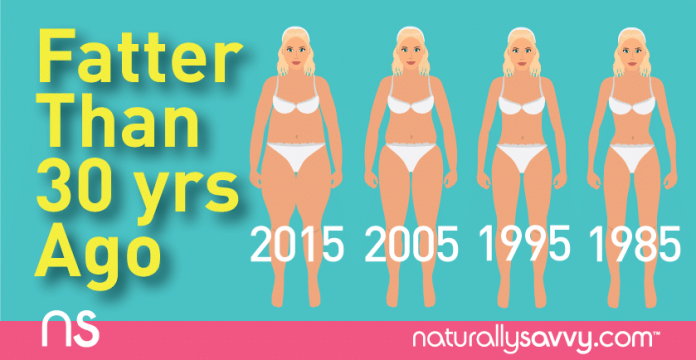
Thirty years ago really were the good old days when it came to eating, exercise, and weight loss. Why? The authors of a new study suggest t’s more difficult for today’s adults to maintain the same weight as their counterparts two to three decades ago, even when the amount of food and exercise are equal.
In other words, a thirty-something today who eats 2,000 calories per day and exercises two hours per week is likely to be about 10 percent heavier than a thirty-something living in the 1980s who followed the same lifestyle habits. How can that be?
It was a surprise to the team at York University in Toronto, who set out to identify whether the relationship between number of calories consumed, amount of physical exercise, and intake of macronutrients (protein, fat, carbohydrates) with obesity has changed over time. To accomplish this goal, they evaluated dietary data of 36,400 Americans between 1971 and 2008 and exercise data of 14,419 individuals between 1988 and 2006.
Read about how early efforts can prevent childhood obesity
What they discovered is that when all three factors were equal, an individual in 2006 would have a body mass index about 2.3 points greater (or about 10 percent higher) than a person in 1988. This is definitely not great news for people today, especially those who are struggling to maintain a healthy weight.
According to one of the study’s authors, Professor Jennifer Kuk in the School of Kinesiology and Health Science, their findings “suggest that if you are 40 years old now, you’d have to eat even less and exercise more than if you were a 40 year old in 1971, to prevent gaining weight.” However, food and exercise are not the only players in this scene. She went on to say that “it also indicates there may be other specific changes contributing to the rise in obesity beyond just diet and exercise.”
The question is, what are the other changes that are contributing to this increase in obesity? Kuk and her colleagues did not come to any conclusions in this study, but they did name some possible candidates:
- Chemical exposure.
Pesticides and some of the chemicals in plastics (e.g., BPA, phthalates), food and food packaging, health and beauty products, furniture, and other everyday products may contribute to weight gain. This is mainly associated with their ability to disrupt hormone function and balance.
Read about toxic pollutants in food increase obesity risk
- Altered gut environment.
The population of microorganisms in the gut, or the microbiome, may not be what it used to be in the 1980s. Since it’s known that certain bacteria living in the gut have an impact on weight gain and obesity, a shift in that population could be a contributing factor. Kuk and her colleagues suggested two eating habits that could be behind the altered gut environment. One is the fact that Americans are consuming more meat today than they did two to three decades–ago and most animal products harbor antibiotics, steroids, and hormones. Another reason is the popularity of artificial sweeteners, which can make you fat. Yet a third reason is the love affair with consuming refined, processed foods, which have been shown to have a detrimental impact on beneficial bacteria in the gut.
- Prescription antidepressant use.
A 2011 report from the Center of Disease Control and Prevention’s National Center for Health Statistics stated that the rate of antidepressant use in the United States increased nearly 400 percent since 1988. It pointed out that about 11 percent of Americans aged 12 or older take these medications, including individuals who have not consulted a mental health professional within the past year. One of the most commonly prescribed antidepressants, the selective serotonin reuptake inhibitor (SSRI) drug Prozac, hit the market in 1988. This SSRI, along with others (e.g., Celexa, Lexapro, Paxil, Zoloft) as well as other antidepressants have been found to have a highly undesirable side effect: weight gain. Experts report that up to 25 percent of people who take antidepressants can expect to pack on an extra 10 pounds or more.
Read about eating less but still fighting obesity
What you can do
The not-so-positive conclusion from all of this?
Kuk stated that if their findings are correct, “you need to eat even less and exercise even more” if you want to weigh the same as your parents did when they were your age.
At the same time, these findings are an incentive to tackle the three candidates for the rise in obesity; that is:
- Do your best to avoid harmful chemicals, especially those that can disrupt hormone balance, including BPH, phthalates, lead, mercury, and organophosphate pesticides.
- Support a healthy gut environment, which includes getting lots of probiotics and following a natural, whole foods eating style.
- If you are taking SSRIs or other medications associated with weight gain, which include corticosteroids, diabetes medication, mood stabilizers (e.g., Clozaril, lithium, Seroquel, Risperdal), or beta blockers (e.g., Inderal, Lopressor, Tenormin), talk to your doctor to see if there are alternatives. Even if there are no drug options for you, at least you will know their use could be contributing to weight gain and you can take steps to change it.
Part 1 of 2. Read part 2 here.
Sources: The Atlantic. Why it was easier to be skinny in the 1980sBrown RE et al. Secular differences in the association between caloric intake, macronutrient intake, and physical activity with obesity. Obesity Research & Clinical Practice 2015 Oct. OnlineMercola.com. Processed foods hurt your immune system and gut healthYork University. Millennials, gen Y need to eat less, workout more to stave off obesity










